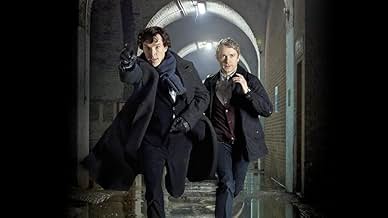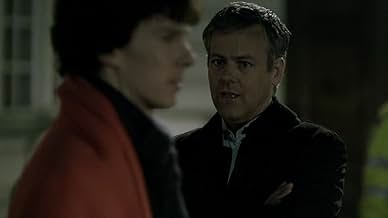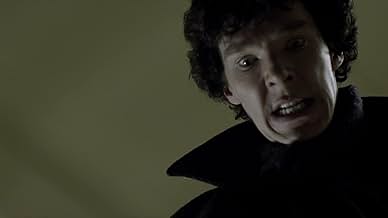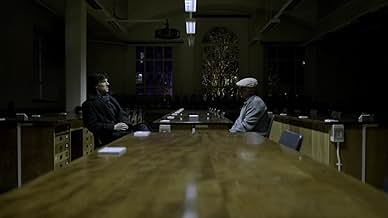War vet Dr. John Watson returns to London in need of a place to stay. He meets Sherlock Holmes, a consulting detective, and the two soon find themselves digging into a string of serial "suic... Read allWar vet Dr. John Watson returns to London in need of a place to stay. He meets Sherlock Holmes, a consulting detective, and the two soon find themselves digging into a string of serial "suicides."War vet Dr. John Watson returns to London in need of a place to stay. He meets Sherlock Holmes, a consulting detective, and the two soon find themselves digging into a string of serial "suicides."
- Director
- Writers
- Stars
Siobhan Hewlett
- Helen
- (as Siobhán Hewlett)
Sean Joseph Young
- Gary
- (as Sean Young)
Ben Rufus Green
- Reporter
- (as Ben Green)
- Director
- Writers
- All cast & crew
- Production, box office & more at IMDbPro
8.935.6K
1
2
3
4
5
6
7
8
9
10
Featured reviews
Greatness
Just watched it on Swedish Television (in Norway), this genial piece of modernized, classical institutionalized British fiction. It's fun and full of suspense. Freeman is perfect as Watson with his neurotic energy. Just as he is in the Office. Cumberbatch is good as the modern Holmes, much like Suchet in the role of Hercule Poirot the last 20 years. The first episode is exciting and fast pacing; reminds of the Dark Night (Batman). Sharp analysis and blending remarks of cosmic intelligence, replacing each continuously. The humor is dry and funny. Holmes'analysis of the initial dead people are clever and modern; you hold your breath while smiling.... Great photography too, dark and earthly colors... I love this episode and series, assuming that the rest is just as good. Holmes is living well in the present moment, his superior deductions are not possible for a conventional thinker, but still possible to relate to. Besides the unnecessary snide remarks about Watsons intelligence, he is as close to Buddhism as it is possible to get, west of Bhutan.
The very best Sherlock Holmes adaptation there is
Sherlock Holmes has lived on to the 21st century: adapting to its technology, but not its society, Sir Arthur Conan Doyle's iconic conception gets refurbished all around by Mark Gatiss and Steven Moffat and is solving the same crimes he has already been solving more than a hundred years earlier in just a slightly altered fashion in Sherlock, a superb BBC series.
The three-part first series commences with "A Study in Pink" and introduces its titular sleuth in what is easily the most peculiar way of all Sherlock Holmes adaptations: flogging a corpse. Of course, that slightly disturbing start fulfils the mere purpose of solving a death and the next scene reveals that Benedict Cumberbatch's rather young Holmes is not that big of a sociopath. In any case, we have yet to see a more spellbinding and distinctive on-screen portrayal of SH (as he signs his text messages) than the charismatic Briton's and because of that, the changes of character traits in comparison to the novels don't concern me at all. His colleague Dr Watson, often narrowed down to a simple right-hand man in adaptations of lesser quality, is equally uniquely and lovably portrayed by Martin Freeman and the two are the perfect match for each other, delivering amusing pieces of black humour, exchanging small insults, and sharing homoerotic dinners. More first- class acting is to be found in supporting roles, with unexceptionally all cast members making the most out of a witty, funny, and not once boring screenplay written by series creator Moffat himself. Especially Phil Davis as the episode's memorable antagonist and series creator Moffat himself as Holmes's brother Mycroft are dazzling additions to the cast and impress as they are conversationally facing Sherlock's two protagonists.
This particular detective story itself is not among the greatest Sherlock Holmes adventures of all time, but is gripping until the end and expertly interwoven with the exposition and establishment part the series pilot logically brings with it. The cream of the crop is the dialogue though, trotted out at a breakneck pace and ever quotable. "A Study in Pink" is then topped off by technical grandeur, in beautiful captures of London and the characters, properly timed editing with not one scene being either too long or too short, a catchy score blending mysterious and funny musical aspects together, and wonderful set design for 221B Baker Street especially. My only issues with Sherlock are the opposite of grave and can be easily dismissed: for one, Sherlock's inner map of London and some of his deductions fly in the face of reason and for the other, his written thought bubbles shown on screen are fully unnecessary when explained just a moment later.
Otherwise, "A Study in Pink" is outstanding filmmaking on every level and brilliant at transferring the original story into this day and age, with Holmes an avid mobile phone user and Watson a veteran of the Afghanistan war. From this pilot onwards, I've considered Sherlock to be the very best adaptation of the Conan Doyle novels there is and one of the most entertaining TV series into the bargain.
My detective scribblings: "How can people keep themselves safe from these serial suicides?" – "Don't commit suicide." Inspector Lestrade, brimming with useful advice. I was quite surprised about not seeing Sherlock reacting to John's two different ways of pronouncing the word 'assume' within a matter of minutes. "I'm not his date!" More serious shows could profit from running gags. Sherlock Holmes receives almost universal disdain in this series and, as he casually mentions to pickpocket from Lestrade when he's annoying, one can somehow relate to that. What an absolutely magnetic sequence of Sherlock discovering the story behind the pink phone that is: flashbacks, cross-cutting, camera movement, and all the brilliant facial expressions by Benedict Cumberbatch make it by far the pilot's most impressing. Best line of dialogue: "I could be wrong, but I think that's really none of your business." John Watson, teaching kids how to courteously tell someone to bugger off.
The three-part first series commences with "A Study in Pink" and introduces its titular sleuth in what is easily the most peculiar way of all Sherlock Holmes adaptations: flogging a corpse. Of course, that slightly disturbing start fulfils the mere purpose of solving a death and the next scene reveals that Benedict Cumberbatch's rather young Holmes is not that big of a sociopath. In any case, we have yet to see a more spellbinding and distinctive on-screen portrayal of SH (as he signs his text messages) than the charismatic Briton's and because of that, the changes of character traits in comparison to the novels don't concern me at all. His colleague Dr Watson, often narrowed down to a simple right-hand man in adaptations of lesser quality, is equally uniquely and lovably portrayed by Martin Freeman and the two are the perfect match for each other, delivering amusing pieces of black humour, exchanging small insults, and sharing homoerotic dinners. More first- class acting is to be found in supporting roles, with unexceptionally all cast members making the most out of a witty, funny, and not once boring screenplay written by series creator Moffat himself. Especially Phil Davis as the episode's memorable antagonist and series creator Moffat himself as Holmes's brother Mycroft are dazzling additions to the cast and impress as they are conversationally facing Sherlock's two protagonists.
This particular detective story itself is not among the greatest Sherlock Holmes adventures of all time, but is gripping until the end and expertly interwoven with the exposition and establishment part the series pilot logically brings with it. The cream of the crop is the dialogue though, trotted out at a breakneck pace and ever quotable. "A Study in Pink" is then topped off by technical grandeur, in beautiful captures of London and the characters, properly timed editing with not one scene being either too long or too short, a catchy score blending mysterious and funny musical aspects together, and wonderful set design for 221B Baker Street especially. My only issues with Sherlock are the opposite of grave and can be easily dismissed: for one, Sherlock's inner map of London and some of his deductions fly in the face of reason and for the other, his written thought bubbles shown on screen are fully unnecessary when explained just a moment later.
Otherwise, "A Study in Pink" is outstanding filmmaking on every level and brilliant at transferring the original story into this day and age, with Holmes an avid mobile phone user and Watson a veteran of the Afghanistan war. From this pilot onwards, I've considered Sherlock to be the very best adaptation of the Conan Doyle novels there is and one of the most entertaining TV series into the bargain.
My detective scribblings: "How can people keep themselves safe from these serial suicides?" – "Don't commit suicide." Inspector Lestrade, brimming with useful advice. I was quite surprised about not seeing Sherlock reacting to John's two different ways of pronouncing the word 'assume' within a matter of minutes. "I'm not his date!" More serious shows could profit from running gags. Sherlock Holmes receives almost universal disdain in this series and, as he casually mentions to pickpocket from Lestrade when he's annoying, one can somehow relate to that. What an absolutely magnetic sequence of Sherlock discovering the story behind the pink phone that is: flashbacks, cross-cutting, camera movement, and all the brilliant facial expressions by Benedict Cumberbatch make it by far the pilot's most impressing. Best line of dialogue: "I could be wrong, but I think that's really none of your business." John Watson, teaching kids how to courteously tell someone to bugger off.
Dazzling
It is no wonder that fans adore the early years of Sherlock, after re-watching the first episode I was once again drawn back into the magic that was created when Sherlock first debuted. I cannot throw enough plaudits at 'A Study in Pink,' it's intelligent, funny, dramatic, bursting with energy, and just generally fabulous in every possible way. The whole premise and setup are beyond genius, I love how the scene was set, with introductions and back story.
Jeremy Brett will always be Sherlock Holmes to me, but Cumberbatch is Sherlock, a new and updated version, his performance was simply iconic.
I found Series Four a bit of a disappointment on the whole, finding it somewhat self indulgent, none of that here, yes it's clever, but not smug.
Superb production values, amazing script, captivating performances, in particular from Phil Davies, what a stellar talent that man is.
Virtually perfect. 10/10
Jeremy Brett will always be Sherlock Holmes to me, but Cumberbatch is Sherlock, a new and updated version, his performance was simply iconic.
I found Series Four a bit of a disappointment on the whole, finding it somewhat self indulgent, none of that here, yes it's clever, but not smug.
Superb production values, amazing script, captivating performances, in particular from Phil Davies, what a stellar talent that man is.
Virtually perfect. 10/10
Well done, Very enjoyable
Much like any 'modern' (set in present day, as opposed to a recent production set in period) remakes of Shakespeare or Sherlock Holmes, they're not quite the same. Not being and aficionado of either, I must say that after watching this on PBS last night, I found it very intriguing, well directed and acted, and a great pleasure to watch. This is a show that I would definitely add to my collection. I did enjoy it more than Guy Ritchie's Sherlock. Not knowing A.C.Doyle's version that well, I found it interesting to find out the relationship between Holmes' and the British Police/Gov't official. Also not knowing anything about Dr Watson's past, I found his character to be intriguing .
Very good, something for everyone.
The show is very good and well-made. Every detail is thought through, and it is very interesting to follow the mind of Sherlock through every moment of the series. Even if you don't like the plot or the acting, then the beautiful scenes of London by day, evening and night will create a atmosphere, you might never forget. In Sherlock you will find something for everyone - whether its the plot, the actors or just the classic story of a detective and his helper. Benedict Cumberbatch is a great choice of actor, and with Martin Freeman on the side they create a powerful match. The long, slim silhouette that is Sherlock next to the small and grey Dr. Watson is a vision you will always remember.
Did you know
- TriviaSherlock kissing Mrs. Hudson on the cheek wasn't scripted. Benedict Cumberbatch had known Una Stubbs since he was very young, and it was his reaction on being able to work with someone who was like a mother to him.
- GoofsSherlock and Watson agree to meet at 7 p.m. to view the flat. When they get there, it's broad daylight. This is not quite possible in London unless it's summer, which, judging from the clothes they wear, is not.
- Quotes
Anderson: So we can read her emails, so what?
Sherlock Holmes: Anderson, don't talk out loud. You lower the IQ of the whole street.
- ConnectionsEdited from Sherlock: Unaired Pilot (2010)
Details
- Runtime
- 1h 28m(88 min)
- Color
- Aspect ratio
- 16:9 HD
Contribute to this page
Suggest an edit or add missing content





















